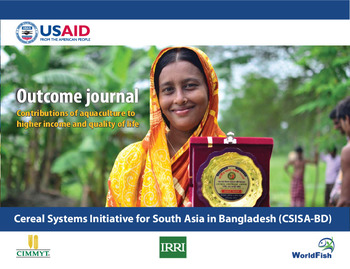Improving income and livelihood of poor farming household in Bangladesh through adoption of improved aquaculture technologies and varieties

Citation
Nahiduzzaman, M. et al. (2015). Improving income and livelihood of poor farming household in Bangladesh through adoption of improved aquaculture technologies and varieties. Dhaka, Bangladesh: WorldFish
Fish are an important part of Bangladeshi culture and diet. Bangladesh ranks among the top five freshwater fish producers in the world. Fish are abundant in the thousands of rivers, ponds, lakes and seasonal floodplains across the country. They are a major source of protein for people living near these waterbodies. In Bangladesh, many households depend on fish farming for their livelihood. By growing fish in homestead ponds, households have a consistent supply of nutritious fish and can sell the surplus for an income. The USAID-funded Cereal Systems Initiative for South Asia in Bangladesh (CSISA-BD) aimed to increase the income of farming households through increased productivity of aquaculture systems. Key activities of the project included developing and disseminating appropriate improved agricultural technology and quality fish seeds to improve livelihoods, food security and nutrition.
Permalink
Date Available
Type
Publisher
Countries
Copyright
CC BY 4.0
Topics